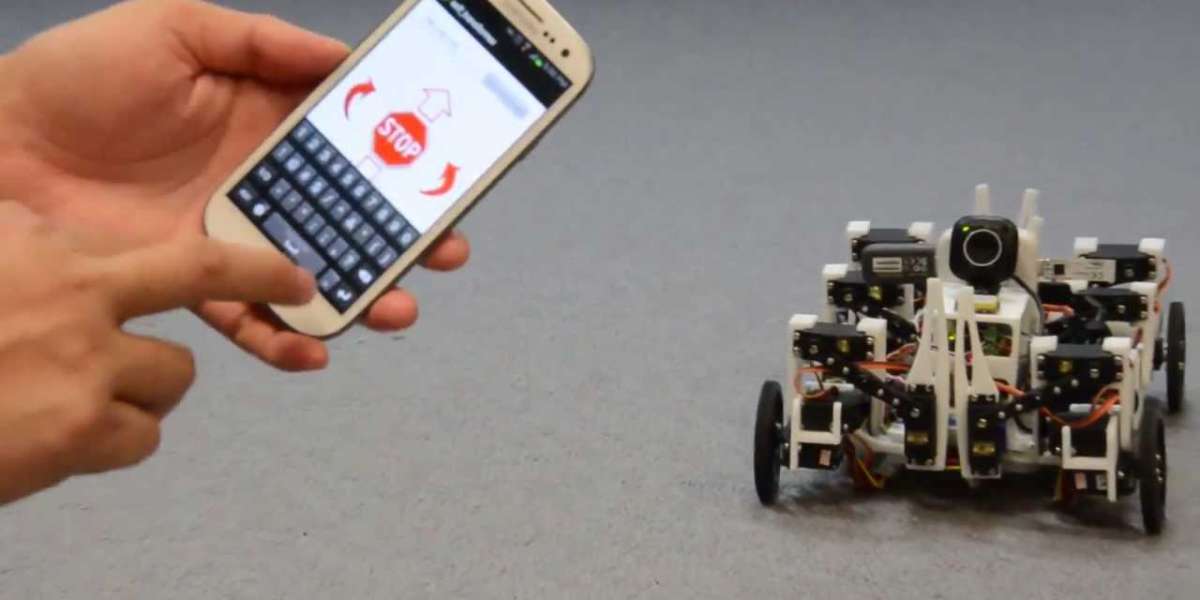Market Overview:
The CAGR for the mobile-controlled robots market is expected to be 15% between 2020 and 2027. The market is expected to be worth USD 8 billion in 2027. It is primarily influenced by the large sale of robots, presence of sensor manufacturers and automation system providers, and large application areas. Furthermore, adoption of robots for companionship and human interaction can expand the scope of the market. Automation of processes is likely to drive the market demand over the forecast period. Establishment of large warehouses and need for workforces has driven the demand for automated ground vehicles.
"Request Free Sample" - https://www.marketresearchfuture.com/sample_request/4169
Regional Analysis
North America region accounts for the largest share in the mobile controlled robots market owing to high development in field of technology and presence of developed countries. The use of robots by hospitals for disinfecting surfaces with the help of ultraviolet light in the U.S. is expected to bode well for the market.
Europe is one of the prominent players in the market of mobile controlled robots. Countries such as U.K., Germany and Italy are the major contributors in the market growth due to large players in manufacturing and automotive industries.
Asia Pacific (APAC) is expected to emerge as fastest growing market during the forecast period. Development of Asian countries and demand for consumer electronic products is forcing the manufacturers to adopt a cost effective technology in the manufacturing process. Presence of various ecommerce firms and warehousing firms for transportation of pertinent goods can bode well for the regional market growth.
Key Players:
- iRobot Corporation (U.S.)
- KUKA AG (Germany)
- Lockheed Martin (U.S.)
- Google, Inc. (U.S.)
- Bluefin Robotics Corporation (U.S.)
- Adept Technology, Inc. (U.S.)
- GeckoSystems Intl. Corp. (U.S.)
- Northrop Grumman Corporation (U.S.)
- ECA Group (France)
- Honda Motor Co., Ltd. (Japan)
Introduction:
The integration of mobile technology with robotics has brought about a significant transformation in various industries. Mobile-controlled robots, also known as teleoperated robots, are being employed in diverse sectors to enhance efficiency, productivity, and safety. These robots are controlled remotely using smartphones or tablets, allowing operators to access and control them from anywhere in the world. In this blog post, we will explore the growing significance of mobile-controlled robots and their impact on industries.
- Healthcare Industry:
The healthcare sector has witnessed substantial advancements with the introduction of mobile-controlled robots. These robots assist healthcare professionals in performing delicate surgeries, reducing human error and improving patient outcomes. They can be remotely operated by skilled surgeons, who can guide the robot's movements with precision. Mobile-controlled robots also play a vital role in telemedicine, enabling doctors to remotely diagnose patients and provide timely medical advice.
- Manufacturing Sector:
Mobile-controlled robots are revolutionizing the manufacturing industry by automating various processes and enhancing efficiency. These robots can be remotely controlled to handle repetitive tasks, assembly line operations, and material handling. With the ability to navigate complex environments, they optimize production processes, minimize downtime, and increase productivity. Manufacturers can monitor and control multiple robots simultaneously, improving overall operations and reducing costs.
- Agriculture and Farming:
The agricultural sector is benefiting from the integration of mobile-controlled robots, leading to increased crop yield and resource optimization. These robots can be utilized for tasks such as planting, irrigation, spraying pesticides, and harvesting. By leveraging real-time data and sensors, farmers can remotely control the robots to optimize water and fertilizer usage, detect diseases, and monitor crop health. This technology enables precision farming, reducing manual labor and improving agricultural practices.
- Logistics and Warehousing:
Mobile-controlled robots are transforming the logistics and warehousing industry by automating inventory management and order fulfillment processes. These robots can navigate through warehouse shelves, pick and pack products, and transport them to the desired locations. By integrating mobile technology, operators can remotely monitor and control the robots' movements, ensuring efficient and accurate order processing. This leads to faster delivery times, reduced errors, and improved customer satisfaction.
- Hazardous Environments:
Mobile-controlled robots have proven invaluable in hazardous environments, where human presence can be dangerous or impractical. Industries such as oil and gas, mining, and nuclear power rely on these robots for inspection, maintenance, and disaster response. Operators can remotely control robots to navigate through challenging terrains, perform intricate tasks, and assess potentially dangerous situations. Mobile-controlled robots minimize the risk to human lives while ensuring critical operations are carried out effectively.
Related Reports
Power Over Ethernet Market - https://www.globenewswire.com/news-release/2022/09/21/2519825/0/en/Power-Over-Ethernet-Market-Is-Set-To-Grow-At-A-CAGR-of-16-20-To-Reach-Valuation-Of-USD-3-2-Billion-By-2030-Report-By-Market-Research-Future-MRFR.html
Electronic Security System Market - https://www.globenewswire.com/news-release/2022/09/19/2518483/0/en/Electronic-Security-System-Market-Projected-to-Hit-USD-19-18-Billion-at-a-CAGR-of-10-20-CAGR-by-2030-Report-by-Market-Research-Future-MRFR.html
Conclusion:
Mobile-controlled robots have emerged as a game-changer across various industries. Their ability to be remotely operated through mobile devices enables greater flexibility, precision, and efficiency. From healthcare to manufacturing, agriculture to logistics, and hazardous environments, these robots are transforming operations and revolutionizing industry practices. As technology continues to advance, we can expect mobile-controlled robots to play an even more significant role in shaping the future of work.



